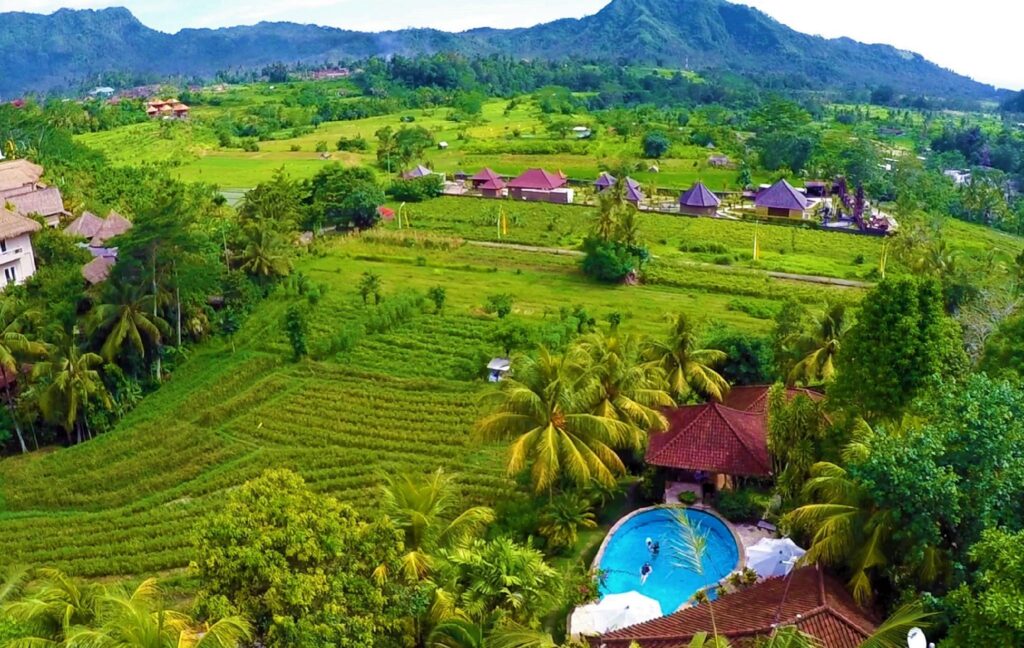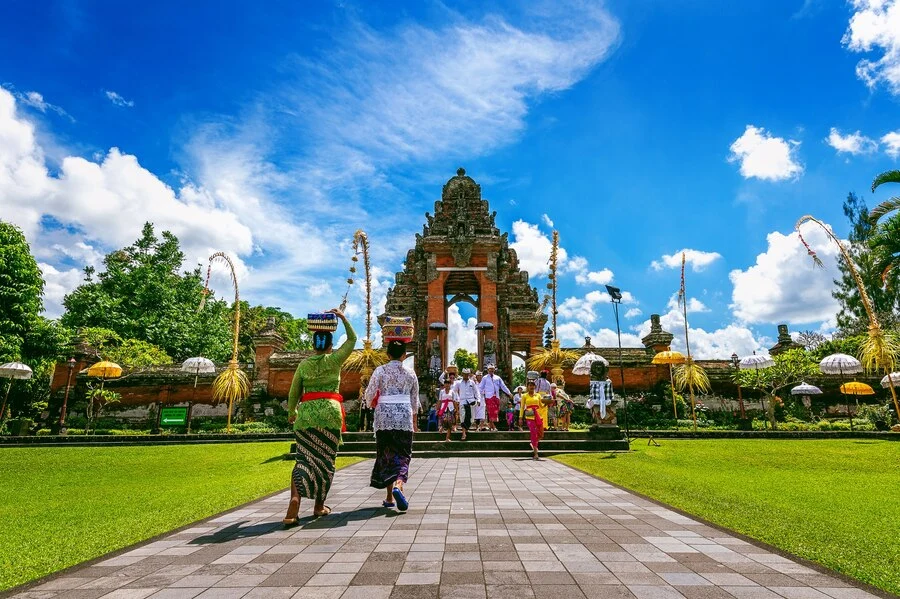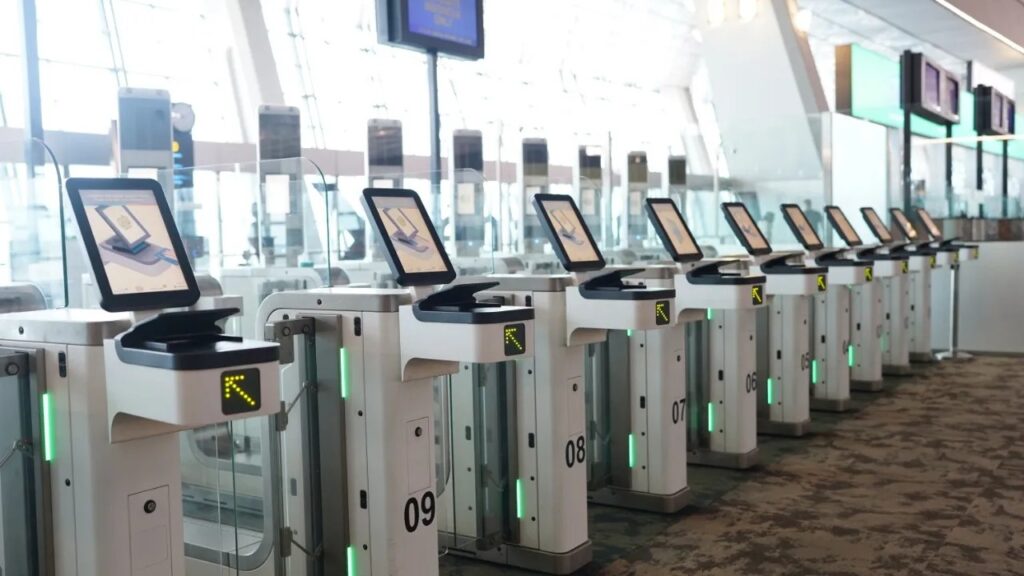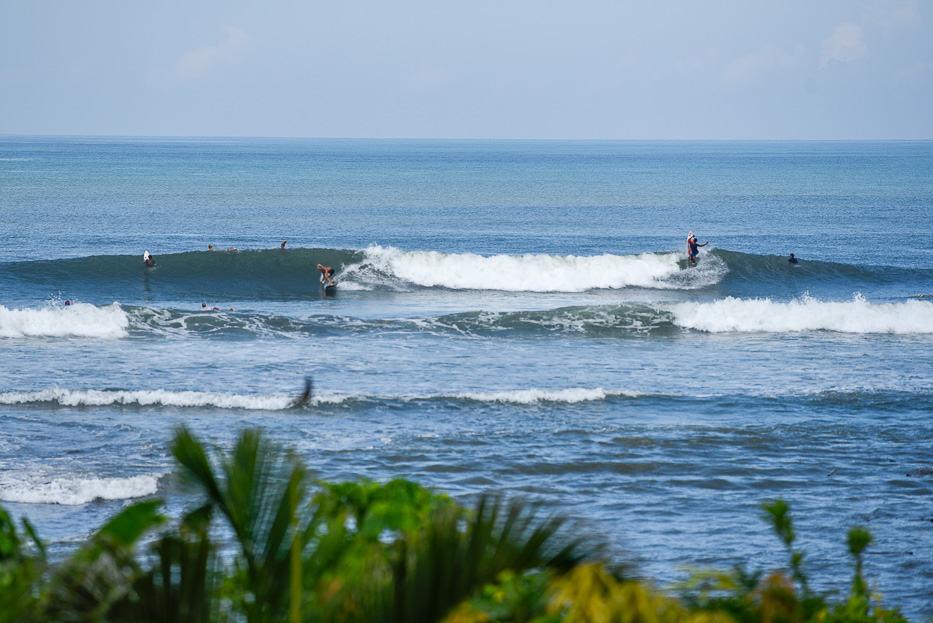In 2025, Bali has entered a powerful new phase—one that places culture, spirituality, and environmental balance at the heart of every traveler’s journey. No longer is the island content to be a backdrop for escapism. Instead, it asks to be seen, heard, and honored.
With soaring tourist numbers and the pressure of global visibility, the Balinese government and local communities have introduced a refreshed set of tourism regulations. These are not just rules—they are invitations to experience Bali as it truly is: sacred, alive, and deserving of reverence.
If you’re planning a trip this year, these changes will shape how you explore temples, beaches, villages, and even digital spaces. But don’t worry—what’s being asked isn’t restriction, but mindfulness. Let’s explore what every visitor needs to know.
1. The “Do’s and Don’ts” of Bali 2025 🧾

From temple visits to selfies on sacred cliffs, travelers in Bali must now navigate a clear code of conduct rooted in Balinese values. These “Do’s and Don’ts,” launched as part of the Love Bali initiative, are posted at airports, accommodations, and temples across the island.
- ✅ DO wear proper attire when entering temples (sarong, scarf, and covered shoulders)
- ✅ DO respect local customs, ceremonies, and village boundaries
- ❌ DON’T climb sacred trees or disturb ceremonial processions
- ❌ DON’T behave disruptively while under the influence of alcohol or drugs
These guidelines protect not just places—but relationships. They’re how you enter Bali not as a consumer, but as a guest.
2. The Sacred Is Not a Selfie Backdrop 📵
Social media has changed how travelers interact with sacred spaces. Temples like Lempuyang or Besakih have become viral photo ops—but the spiritual context is often ignored. In 2025, authorities are encouraging respectful interaction over curated content.
- New signage reminds visitors that temples are not fashion shoots
- Many ceremonies now restrict mobile phone use during rituals
- Temple guardians (pemangku) may guide or redirect visitors violating etiquette
The message is clear: come to witness, not to perform.
3. New Entry Fees to Support Sustainability 🌱
A key change in 2025 is the introduction of a mandatory tourism levy for foreign visitors. The fee—IDR 150,000 per traveler—is collected online or at entry points, and supports cultural preservation, waste management, and infrastructure.
- Funds are reinvested in maintaining temples, roads, and water systems
- Beach cleanups and coral restoration projects are partially funded by this levy
- Visitors receive a digital confirmation to show at certain checkpoints
By contributing, you become part of the solution—protecting what makes Bali beautiful.
4. Promoting “Quality Over Quantity” Visitors ✨
Bali’s tourism board is shifting its focus. Rather than encouraging mass travel, it now promotes longer stays, slower travel, and more meaningful interactions.
- Visa options encourage remote workers and long-term visitors
- Eco-tourism and cultural tours are prioritized by local operators
- Overcrowded areas are being balanced with village tourism development
This gentle transformation asks travelers to not just pass through, but to belong—even briefly.
5. Respecting Nature Is Now a Rule 🌊🌋

The connection between nature and spirituality is the heartbeat of Balinese life. As such, new laws continue to emerge not only as ecological responses but as cultural safeguards. In addition to long-standing initiatives, 2025 brings deeper measures to protect sacred sites, watersheds, and wildlife corridors that form the island’s spiritual backbone.
Visitors to Mount Agung or Mount Batur are now required to be accompanied by certified local guides trained in conservation ethics. This ensures safety while protecting fragile trails from erosion. Dive schools must meet new eco-certification benchmarks, and marine parks have strengthened regulations to curb overcrowding and coral disruption.
On beaches, the “no plastic” policy is being strictly enforced. Vendors have transitioned to biodegradable packaging, and travelers are encouraged to bring reusable gear for snorkel, surf, and sun.
These rules are not just practical—they’re symbolic. Every discarded bottle or unregulated trek leaves a scar, not just on the earth, but on the sacred energy it holds.
- No single-use plastics in national parks or protected zones
- Mount Agung and Mount Batur have new guided trek rules to limit erosion
- Surf schools and dive shops must follow eco-certification standards
The island is not a playground—it’s a living, breathing ecosystem.
In response to rising environmental concerns, Bali is tightening regulations on how visitors interact with nature. This includes protected marine parks, sacred mountains, and even rice terraces.
- No single-use plastics in national parks or protected zones
- Mount Agung and Mount Batur have new guided trek rules to limit erosion
- Surf schools and dive shops must follow eco-certification standards
The island is not a playground—it’s a living, breathing ecosystem.
6. Governor’s Law: Carry Your Own Water Bottle 💧

One of the most progressive regulations introduced in 2025 is outlined in Governor of Bali’s Circular No. 9 of 2025, which prohibits the production and distribution of single-use plastic bottled water under 1 liter across the province. The law applies to all business entities operating in Bali, including national and local beverage producers.
The primary aim? To combat Bali’s growing plastic waste crisis while encouraging innovation in sustainable packaging. Governor Wayan Koster emphasized that this isn’t about punishing producers—it’s about challenging them to create better, eco-conscious solutions like reusable glass or biodegradable containers. As an example, he praised a local business in Karangasem for producing mineral water in glass bottles.
- Companies like Danone and PDAM are being called to adjust production standards
- All bottled water in Bali must now be 1 liter or more, ideally in refillable or non-plastic formats
- The government is also meeting with suppliers to ensure compliance across distribution chains
This rule also aligns with Bali’s Bali Clean Waste Movement (Gerakan Bali Bersih Sampah), which empowers both residents and travelers to be stewards of change.
You’ll now see refill stations in airports, hotels, cafés, and attractions. Reusable bottles are being offered by resorts, and some tours may deny participation if you arrive with plastic-packaged water.
- Refillable water stations are available in key tourist areas and hotels
- Some tours now require proof of carrying your own bottle before departure
- Local brands offer sustainable bottle options as functional souvenirs
It’s a small act with a large impact—a reminder that hydration and harmony go hand in hand—and that clean water and clean intentions should flow together.
7. A Complete Code of Conduct: Governor’s Circular No. 7 of 2025 📜

To guide and protect both local culture and visiting guests, the Governor of Bali issued Circular No. 7 of 2025, outlining official rules for foreign tourists. This formal document defines both mandatory behaviors and prohibited actions, and is being strictly enforced across the island.
Travelers are expected to uphold local wisdom through respectful conduct, modest dress, and financial responsibility. Beyond suggestions, these expectations are now codified law:
- Dress modestly when visiting temples, public spaces, and tourist sites
- Behave respectfully in sacred areas, restaurants, streets, and markets
- Pay the mandatory foreign tourist levy via lovebali.baliprov.go.id
- Use licensed tour guides when visiting cultural or sacred destinations
- Exchange currency only at legally permitted money changers (KUPVA BI)
- Use Indonesia’s QRIS payment system and pay with Rupiah
- Follow all traffic rules: wear helmets, carry a valid license, and respect signage
- Book only licensed accommodations and authorized rental vehicles
Just as importantly, the circular lays out firm prohibitions:
- Do not enter temple sanctuaries unless participating in prayer and wearing traditional attire
- Do not climb sacred trees or disrespect ceremonial spaces
- Avoid plastic waste, improper behavior, or nude photography in sacred areas
- Refrain from working or doing business without legal permits
- Absolutely avoid the trade or disturbance of flora, fauna, or cultural artifacts
Violators may face strict legal consequences, including restrictions from entering temples, police reports, and legal proceedings.
To support transparency, locals are encouraged to report misconduct through the official WhatsApp Siaga number: 081-287-590-999.
The regulations serve not as barriers—but as bridges to a more harmonious, thoughtful, and reciprocal relationship between travelers and the island.
🏨 Curated Luxury Stays in Harmony with Bali’s Vision

- Mandapa, a Ritz-Carlton Reserve – Ubud
A tranquil Ritz-Carlton Reserve along the Ayung River offering spiritual immersion in Ubud’s lush valley. - Capella Ubud – Ubud
An enchanting jungle hideaway in Ubud where canvas tents meet refined artistry and sacred storytelling. - The Kayon Jungle Resort – Payangan
A romantic adults-only resort perched above a forested river, designed for healing and heart-opening moments. - Bvlgari Resort Bali – Jimbaran
A cliffside masterpiece blending Italian elegance with Balinese heritage and sweeping ocean views in Uluwatu. - W Bali – Seminyak – Seminyak
An energetic beachfront icon in Seminyak fusing high design, DJ culture, and laid-back luxury. - Amankila – Candidasa
A serene cliffside estate in East Bali inspired by royal palaces and offering private access to black-sand beaches. - Wapa di Ume Sidemen – Sidemen
A peaceful retreat nestled in rice terraces where slow living and traditional Balinese life coexist beautifully.
Bali is not asking us to be perfect—it’s asking us to be present. To slow down. To look beyond the lens, the resort, the itinerary—and into the soul of the island itself.
With the newly issued Governor Circulars No. 7 and No. 9 of 2025, Bali is making it clear: tourism must be a two-way harmony. It’s not just about what we gain, but what we give. Respect for culture. Support for sustainability. Consciousness in every choice.
Whether it’s bringing your own bottle, dressing respectfully at temples, or choosing licensed guides and businesses, each gesture is a thread in the larger weave of harmony Bali hopes to protect.
To visit Bali now is to join a movement. One that cherishes tradition, nurtures nature, and celebrates a shared future.
Written by the team at BaliExpertGuide.com, where travel meets respect, and experience becomes transformation.
🌿 Stay connected for daily tips and respectful travel updates:
👉 https://www.instagram.com/baliexpertguide




